- Page 2: LIBRARY OF THE UNIVERSITY OF ILLINO
- Page 7 and 8: THE HOUSE OF MORRELL BY LAWRENCE OA
- Page 9 and 10: FOREWORD FOR MORE THAN A GENERATION
- Page 11 and 12: on the Missouri. Three other railro
- Page 13 and 14: The great Morrell plant at Sioux Fa
- Page 15: company records and inviting histor
- Page 18 and 19: Dedicated to all those whose effort
- Page 21 and 22: ing in the homes of the town. The c
- Page 23 and 24: on the Bradford market. Particularl
- Page 25 and 26: 1837 4^ ia46 (^\i^ The partnership,
- Page 27 and 28: He was deeply impressed by the kind
- Page 29 and 30: ORGANIZER OF JOHN MORKliLL S: CO.
- Page 31 and 32: employment in whatever occupation m
- Page 33: 1 8 t T I S /^JL/ltstQi' The third
- Page 36 and 37: and turned over a considerable port
- Page 38 and 39: tccincd liiifhly meat from buffalo,
- Page 40 and 41: farm was a festive occasion. Many o
- Page 42 and 43: ! production, except that it stinte
- Page 45: IBS 7^ IU66 ir Tt "ir Operations in
- Page 48 and 49: or four 3'ears. Then gradunlly it d
- Page 52 and 53: cheese, were very extensive. He sec
- Page 54 and 55: Ill Ul
- Page 56 and 57: : 5o°. I was the inspector and had
- Page 58 and 59: eferences to such an operation in n
- Page 60 and 61: North American shores. Foster, in h
- Page 62 and 63: : Castlecomcr; had worked in the cu
- Page 64 and 65: Foster to his parents and it seems
- Page 66 and 67: delusion. Everything I laid hands t
- Page 68 and 69: Lincoln Park and a Catholic cemeter
- Page 70 and 71: cured for hogs and cattle delivered
- Page 72 and 73: eprcsentatixc of John Morrell & Co.
- Page 75 and 76: were elected directors on October i
- Page 77 and 78: — Now It is hereby agreed as foll
- Page 79 and 80: when the Company shall allot the sa
- Page 81 and 82: 8.—The said parties hereto of the
- Page 83: ever to take ice from the Des Moine
- Page 86 and 87: I838-I893 CHAIRMAN, 1881-1890
- Page 88 and 89: efore. He was told to make another
- Page 90 and 91: which gives a good insight to the c
- Page 92 and 93: fice. George Morrell, grandson of t
- Page 94 and 95: of meats, that would do credit to a
- Page 96 and 97: father gave all their love and devo
- Page 98 and 99: Kill and Cut; A. R. Brown, Zell Zim
- Page 101:
1887* 18d6 y^l.'Trrtn*. In 1887 the
- Page 104 and 105:
subject to any such conditions and
- Page 106 and 107:
founded in 1878 with T. D. Foster a
- Page 108 and 109:
twenty to twenty-five different cut
- Page 110 and 111:
^^^^J^T^uuuIJ 1845-1905 CHAIRMAN, 1
- Page 112 and 113:
eceiving messages. Contracts for ho
- Page 114 and 115:
ernments the healthfulness of Ameri
- Page 116 and 117:
: Agents of European countries whic
- Page 118 and 119:
First, he told about an Englishman
- Page 120 and 121:
expect no better fate along our pre
- Page 122 and 123:
cattle being very cheap but this T
- Page 124 and 125:
might have been given by the direct
- Page 126 and 127:
them right but hardly looked for su
- Page 128 and 129:
the ruins of his phint — Si fract
- Page 130 and 131:
placed in complete charge of the bo
- Page 132 and 133:
launched with a membership of 300.
- Page 135 and 136:
is forced by the pump, which is not
- Page 137 and 138:
the jobbing trade when we were out.
- Page 139 and 140:
trusting to our quality to overcome
- Page 141 and 142:
Junior Director shall only have one
- Page 143 and 144:
valuable outlet for the company's p
- Page 145 and 146:
and the cream was separated by hand
- Page 147 and 148:
a visit. Hormel accepted the invita
- Page 149 and 150:
around Ottumwa for thousands of acr
- Page 151 and 152:
M. T. McClelland had been placed in
- Page 153 and 154:
While not strictly an advertising p
- Page 155:
viously been outside the law. It pu
- Page 159 and 160:
Following completion of negotiation
- Page 161 and 162:
1873- MANAGER, SIOUX FALLS PLANT, 1
- Page 163 and 164:
"With the growing demands of the pa
- Page 165 and 166:
Burnham of Kittery, Me., met at Kit
- Page 167 and 168:
I864-I92I PRESIDENT, JOHN MORRELL &
- Page 169 and 170:
11. If this iVgreement shall not be
- Page 171 and 172:
suitable resolutions expressive of
- Page 173 and 174:
it looked as if the plant would act
- Page 175 and 176:
Liverpool directors, apparently in
- Page 177 and 178:
1865-1924 CHAIRMAN, JOHN MORRELL &
- Page 179 and 180:
the methods for producing hog chole
- Page 181 and 182:
expanded exports. Therefore there w
- Page 183:
efore. The Sioux Falls mark was fir
- Page 187 and 188:
uncertainties of every kind, have a
- Page 189 and 190:
troubles of private ownership and p
- Page 191 and 192:
ments based on our position in the
- Page 193 and 194:
we do not stand accused nor as far
- Page 195 and 196:
effort but rather the result of a c
- Page 197 and 198:
MANAGER, SIOUX FALLS PLANT, 1909-19
- Page 199 and 200:
sent to Sioux Falls to head stock b
- Page 201 and 202:
started operations on August 29, 19
- Page 203 and 204:
eport for the period ended March 31
- Page 205 and 206:
in wages or any increase in the eig
- Page 207 and 208:
ness in this southern California ci
- Page 209 and 210:
Falls; George Willging, who was sen
- Page 211 and 212:
eceived vacations that first year,
- Page 213 and 214:
"Having in mind that we are one big
- Page 215:
portance and finally omitted entire
- Page 219 and 220:
true facts pertaining to the foundi
- Page 221 and 222:
President Foster then concluded the
- Page 223 and 224:
involved in this action was a new o
- Page 225 and 226:
Falls, South Dakota, covering appro
- Page 227 and 228:
charged out of earnings and is cons
- Page 229 and 230:
the changing of the date of annual
- Page 231 and 232:
een approved increasing the number
- Page 233 and 234:
forgotten levels and the market pri
- Page 235 and 236:
hearty response on the part of the
- Page 237 and 238:
destroyed, while the heavier pigs a
- Page 239 and 240:
How this tax affected the price of
- Page 241 and 242:
He just didn't like to be the goat.
- Page 243 and 244:
uary 22. Later this temporary arran
- Page 245 and 246:
and wrappings used by that plant. T
- Page 247 and 248:
one the association of the two Iowa
- Page 249 and 250:
partment was able to handle a maxim
- Page 251 and 252:
Street branch and from nearby sales
- Page 253 and 254:
and John H. Morrell. He continued i
- Page 255 and 256:
and was succeeded by G. M. LaFollet
- Page 257 and 258:
William Regan resigned and was succ
- Page 259 and 260:
ger, with E. F. Paxson, manager at
- Page 261 and 262:
yon Bill was introduced into Congre
- Page 263 and 264:
facturers at each year's show. Ther
- Page 265 and 266:
19 3 7 ^iHpEr jBTf V ^93^' Actual w
- Page 267 and 268:
y-laws were again amended, increasi
- Page 269 and 270:
W. Mock, assistant secretary. Other
- Page 271 and 272:
y^- ^yU^. czzZ-Zr^ZiAZ 1887- PRESID
- Page 273 and 274:
at many times during World War II,
- Page 275 and 276:
dry salt fat backs and lard for suc
- Page 277 and 278:
for meat cuts; increased wages also
- Page 279 and 280:
age resulting from the drought and
- Page 281 and 282:
to decontrol by the O. P. A., incre
- Page 283 and 284:
ell research laboratories, and afte
- Page 285 and 286:
During that same year an extension
- Page 287 and 288:
Des Moines branch ceased operations
- Page 289 and 290:
A. T. Dennis resigned as Sioux Fall
- Page 291 and 292:
fet^^t/" Z r=Ar^Ziyi^ 1908- MANAGER
- Page 293 and 294:
Austrian & Piatt was employed to ha
- Page 295:
603. On May 12, 1938, another elect
- Page 298 and 299:
29. A retirement income plan for em
- Page 301 and 302:
First killing gang — Ottuniwa —
- Page 303 and 304:
I Another new building at Ottumwa,
- Page 305 and 306:
An artist's conception of the Chas.
- Page 307 and 308:
*~ The O t tu m w a plant packing r
- Page 309 and 310:
A. C. iMORRELL Director, Vice Presi
- Page 311 and 312:
•^ T h e office of the Ottumwa pl
- Page 313 and 314:
Freezers, Ottum- ^~ Ottumwa beef co
- Page 315 and 316:
Bg^2x»|^-} An early Mmrcll rcl rlj
- Page 317 and 318:
INDEX Aberdeen, S. D., branch opene
- Page 319 and 320:
Crawford, Theodore, 274 Cataract
- Page 321 and 322:
; corporation, 249; vice president,
- Page 323 and 324:
Garretson, R. L., 240 Garrod, G. W.
- Page 325 and 326:
Manchester Market, 34 Mo(fitt, Mike
- Page 327 and 328:
ness, 17-19; forms partnership with
- Page 329 and 330:
I934i 221-222; plant purchased in T
- Page 331 and 332:
; Post-war planning, 277-27S Powell
- Page 333:
ernment, 221; plant purchased in, 2






![La musa galante [microform] - University Library](https://img.yumpu.com/50760818/1/190x222/la-musa-galante-microform-university-library.jpg?quality=85)










